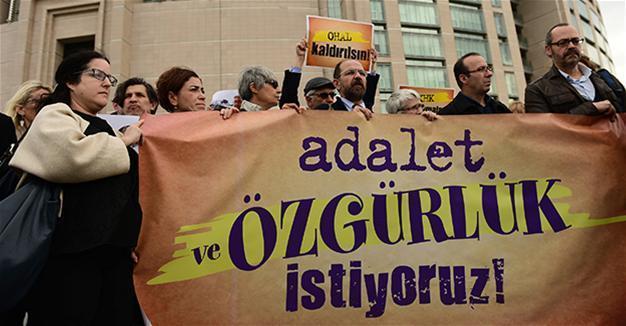Imprisoned novelist Aslı Erdoğan at risk of being paralyzed: CHP deputy
ANKARA

Journalists and activists hold a banner reading ''We want justice and freedom''on November 8, 2016 in front of Çağlayan courthouse in Istanbul. AFP photo
Turkish novelist Aslı Erdoğan, arrested in August on terror charges as part of the investigation into closed daily Özgür Gündem, is at risk of being paralyzed while in jail, main opposition Republican People’s Party (CHP) deputy Utku Çakırözer has said.
In a parliamentary question submitted to be answered by Justice Minister Bekir Bozdağ, Çakırözer detailed ongoing restrictions to fundamental rights of the imprisoned after the failed coup attempt of July 15, pointing to health problems faced by many inmates, including a number of journalists and writers.
“Aslı Erdoğan is at risk of apoplexy. Ahmet Turan Alkan has lost an unusual amount of weight. There is also a problem meeting hospital demands. Sometimes inmates have to wait and sometimes they return without seeing the doctor,” Çakırözer said, speaking after a series of meetings with those imprisoned under the state of emergency declared after the attempted takeover.
“Aslı Erdoğan has been referred to hospital four times and each time she has returned without seeing the doctor,” he added, noting that there had been delays of up to one week in providing necessary medicines.
“Our colleagues are subjected to total isolation in prison, which is against human rights,” Çakırözer stated.
A member of Özgür Gündem’s advisory board, Erdoğan was arrested on Aug. 19 on charges of being a member of armed terror organization after a court ordered it closed for allegedly engaging in propaganda for the outlawed Kurdistan Workers’ Party (PKK). Her health is known to be fragile and she is in constant need of medication.
A total of nine suspects, including Erdoğan, face aggravated life sentences as well as prison terms ranging from six-and-a-half to 17.5 years on charges of being a member of an armed terror organization, disrupting the unity of the state and conducting terror propaganda.
In addition, Çakırözer also referred to restrictions on the imprisoned journalists and writers on letters, books and meetings with their relatives, criticizing the measures as “a pyschological torture.”
“The state of emergency has further aggravated prison conditions. The imprisoned, including our colleagues, are deprived of their fundamental rights and freedoms. The fact that journalists and writers are deprived of their freedoms due to their opinions and writings is the biggest violation of rights,” he stated.
According to Çakırözer’s observations, many of the imprisoned are not allowed to send any written material, including letters, and cannot receive letters either, a situation they criticize as “the most relentless sentence, psychological torture.”
Sending books to prisons is also not allowed and the imprisoned only have limited access to books in the prison library, Çakırözer said, adding that this meant the imprisoned face problems accessing printed materials required for their plea.
On the issue of communication with relatives, Çakırözer said prisoners’ open meetings had been reduced to one every two months from one every month, while phone conversations were reduced to one every 15 days from one every week.
Unlimited lawyer meetings were also reduced to one every week and limited to one hour in length, he added, noting that meetings with lawyers are also accompanied by a warden and held under the surveillance of security cameras.
